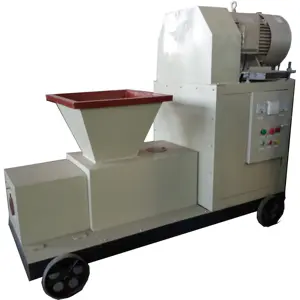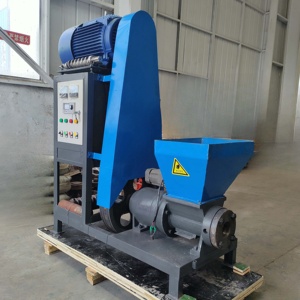(1503 products available)
































































































































































































































A briquette machine 80 is a piece of machinery that compresses loose biomass material into compact units or briquettes. Different briquette machines operate based on distinct working principles. The following are the major types:
Screw press briquette machine
This machine uses an Archimedes screw to push the mixed biomass material against the heated barrel. The screw rotates and feeds the raw material into the compression chamber. The friction between the screw and chamber heats the biomass until it melts. The screw further compresses the melted biomass into briquettes through the exit hole.
The screw briquette press machine gives operators control over the briquette diameter. However, it has a lowproduced volume, which is ideal for small or startup businesses.
Hydraulic briquette machine
This machine uses a hydraulic system to compress raw material mixed with binders. The system exerts high pressure in the form of repetitive cycles. Unlike the screw machine, this machine produces cylindrical or cubic briquettes with consistent density.
A major advantage of hydraulic briquette presses over screw presses is they can handle biomass material with very little lignin. Nevertheless, the machines are very large and use more energy than the screw and piston designs.
Although hydraulic machines operate at a higher power and pressure, they produce fewer briquettes per machine hour compared to piston models.
Piston briquette machine
The piston briquette machine uses mechanical stamping to produce briquettes. The loose biomass material is pushed into the mold by a feeder or screw. The material is then heated and compressed by a piston. The piston applies high pressure to the biomass until it forms a briquette and drops out of the machine.
Piston briquette machines are also referred to as stamp presses. They operate at high pressure to produce a large volume of briquettes. They are cost-effective for medium and large-scale companies.
The stamp press machine makes durable briquettes because it applies high pressure to the material. It also produces briquettes of varied shapes like square, round, and others. However, the machine forms briquettes only under high pressure and requires a lot of electricity to operate.
Understanding the specifications of an 80 briquette machine is crucial when getting one. Here are a few core specifications that buyers will encounter on different machines:
Production Capacity:
The production capacity of the machine is the quantity or weight of the briquettes it makes. For an 80 briquette machine, the typical production capacity ranges from 1,500 to 2,500 kilograms per hour, depending on the model and specific features.
Power:
An 80 briquette machine converts raw materials into solid fuel briquettes by applying pressure. The machine consumes different power levels depending on its design and size. The power requirements also vary based on factors like feedstock type, moisture content, and desired briquette density. Typically, an 80 briquette machine uses power that ranges between 20 and 100 kilowatts.
Raw Material:
An 80 briquette machine can process diverse materials and transform them into high-quality briquettes. Common raw materials include agricultural waste, biomass, wood waste, and paper waste, among others.
Packing Dimension:
The dimensions for packing an 80 briquette machine generally ranges from approximately 250 to 330 centimeters in length, 120 to 160 centimeters in width, and 135 to 15 centimeters in height.
Machine Weight:
Like the packing dimensions, the weight of the machine differs based on model and make. For an 80 briquette machine, the weight typically ranges between 2,200 to 3,500 kilograms.
Regular maintenance and timely repair of an 80 briquette machine help to ensure it runs smoothly. Doing so also helps to ensure safety and reduce breakdown risks. Here are general 80 briquette machine maintenance and repair tips:
Renewable energy production companies:
These companies may use a briquette press machine to produce biomass fuel briquettes from organic waste, wood chips, or agricultural residues. The briquettes serve as a clean and renewable energy source for heating, power generation, or as substitutes for fossil fuels.
Small-scale farmers:
Farmers can use an 80 mm briquette machine to convert crop residues, such as straw or husks, into briquettes. Selling these farmers fuel briquettes can generate income while reducing waste and promoting sustainable farming practices.
Rural communities:
In remote or rural areas with limited access to conventional fuels, briquette machines can be valuable. Residents can produce briquettes from locally available biomass materials, reducing dependence on expensive or unsustainable fuels.
Industrial manufacturing plants:
Some manufacturing plants use briquettes as raw materials in production processes. For example, carbonized briquettes can serve as a source of carbon in the production of steel, iron, or other materials, enhancing the properties of the final products.
Food processing companies:
Food processing companies generate a large amount of organic waste, such as fruit peels or coffee grounds. These companies can utilize a briquette machine to convert the waste into briquettes, which can be used for energy on-site or sold to others.
Production requirements:
Understand the production requirements, including raw material types and characteristics, briquette types, shapes, sizes, and density. Business buyers should first confirm their production needs and ensure the machine can meet these requirements.
Production capacity:
Determine the required production capacity according to the scale of the business operation. Business buyers need to consider the machine's production capacity and operating efficiency to ensure it can meet the demands.
Automation and intelligence:
Depending on the scale of business operations, consider the degree of automation and intelligence in the machine. Features such as automatic feeding and pressure regulating systems can enhance production efficiency and reduce labor costs.
Impact on product quality:
The setting of pressure and density is crucial for product quality. Business buyers must ensure the machine can adjust pressure and product density according to their needs. Additionally, consider whether the machine has any special features or addons that can improve product quality.
Energy consumption and efficiency:
Consider the energy consumption and energy utilization efficiency of the machine. Choose a machine that uses energy efficiently can reduce production costs and have a positive environmental impact.
Maintenance and service:
Choose a reliable equipment supplier that provides excellent after-sales support and maintenance services. Ensure the supplier can provide timely technical support and spare parts services.
Cost and budget:
Before purchasing, business buyers must compare machines' performance, production capacity, energy consumption, etc. They should also consider the long-term operating costs and maintenance expenses to ensure they stay within their budget.
Q1: What raw materials can the 80-mm briquette machine compress?
A1: The 80-mm briquette machine is suitable for various raw materials, such as biomass waste, agricultural residue, wood by-products, paper and cardboard, rubber and plastic, dust and sludge, organic municipal solid waste, and sit in materials. Compressed, solid briquettes will facilitate disposal and recycling.
Q2: What is the output of an 80-mm briquette machine?
A2: The output of an 80-mm briquette machine depends on its size and power rating. An 80-mm mini briquette machine in a mobile unit, for example, could produce up to 150 kg per hour. An 80-mm industrial briquette machine could produce between 500 kg and 1,500 kg per hour. A large, heavy-duty briquetting press could produce even more.
Q3: Is there any maintenance required for an 80-mm briquette machine?
A3: Routine maintenance helps ensure that the 80-mm briquette press performs efficiently. Some solid and moving parts may wear out or get damaged due to dust and water. So, spare parts like bearings, solid parts, shafts, etc., will require regular maintenance and replacement to avoid frequent breakdowns and downtime. Efficient and timely maintenance will reduce repair costs.
Q4: Does the 80-mm briquette machine need operator assistance?
A4: Small 80-mm briquette machines do not need operator assistance and uncertain operator safety. However, larger industrial 80-mm machines are heavy and more dangerous. With their high-voltage electrical components, they will require operator support and safety measures. Emergency stop buttons can enhance operator safety.